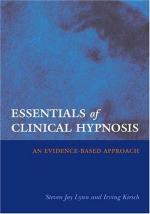|
This section contains 1,910 words (approx. 7 pages at 300 words per page) |

|
Hypnosis is a social interaction in which one person, called the subject, acts on suggestions from another person, called the hypnotist, for imaginative experiences involving alterations in cognition and voluntary action. Among those individuals who are most highly hypnotizable, these alterations in consciousness can be associated with subjective conviction bordering on delusion, and an experience of involuntariness bordering on compulsion.
Posthypnotic Amnesia
Upon termination of hypnosis, some subjects find themselves unable to remember the events and experiences that transpired while they were hypnotized. This posthypnotic amnesia does not occur unless it has been specifically suggested to the subject, and the memories are not restored when hypnosis is merely reinduced. Moreover, amnesia can be suggested for events that occurred outside of hypnosis. Thus, post-hypnotic amnesia is not a form of state-dependent memory. However, it is temporary: Upon administration of a prearranged cue, the amnesia is...
|
This section contains 1,910 words (approx. 7 pages at 300 words per page) |

|


